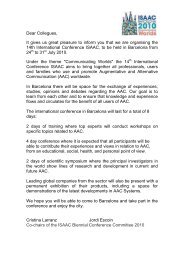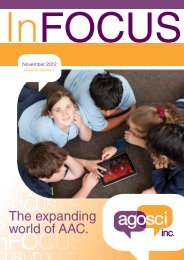May 2008 Edition - agosci
May 2008 Edition - agosci
May 2008 Edition - agosci
You also want an ePaper? Increase the reach of your titles
YUMPU automatically turns print PDFs into web optimized ePapers that Google loves.
ccommunicationo m m u n i c a t i o nppartnersa r t n e r sA Communication Partner Reflects ... (cont)can only assume that can’t I but…Let’s say the people who interact inappropriately do thatwith the majority of people and that’s just how they aregenerally…• Seeing the person with communication needs as aperson;I think it’s about people reacting with her in a genuineway. I mean it’s really hard to explain it but um treatingher one on one as a real person.[Sometimes people] do that horrible thing of talking tome about Alice as if she’s not there. Hmmm. And whenthat happens I always speak to her directly and then well“No – she’s sitting right here with us! What’s?” You know.Some of them will - ruffl e her hair. Horrible!• Valuing relationship with the person with communicationneeds;But the bottom line is…I know I’ve built up a relationshipwith her that wasn’t there immediately – no way!She appears to recognise my voice now – I think.In a sort of fantasy world I would love to be able to goto see her after a period of time [after she’d moved outof the unit]. I’d wonder if she would recognise my voiceor recognise me. That would be mammoth. I mean that’spurely totally selfish on my part but I’d love to know if- I’m sure she’d recognise something about me…andit’s not what keeps me going -it’s just a fantasy thingif you’re allowed to have those in your working day. Itsounds bizarre. It’s the truth I guess.The other day I was talking to Susie, and Alice sort ofturned her head I don’t know if she recognised my voiceor something …and that was hugely gratifying…to getsomething back.• Working together with the person with a communicationneed - as a mutual task where both have agency;Personally between Alice and I - we’ve worked togetherfor a long time and I think somewhere there must besomething about not wanting to give up.It’s that time factor and it’s just taken us four years to getto where we are now.Getting to know each other - it’s defi nitely taken timeand it’s taken time with her too – I mean I sense it’s verymuch a two way street.[Walking in the garden]’s something I really enjoydoing…hopefully she picks up on my keenness for it.• Valuing the inclusion and the potential of the personwith communication needs;The other morning I saw Alice in the dining room havingbreakfast sitting at the table in her chair having breakfastand that was the first time ever I have seen her in thedining room and they’re trying to actually do that now– working to the whole community thing I mean…It waslovely to see!I’d love to see it now that she is more communicativewith us Alice interacting with a family member – one ofher kids…see her with somebody else she’s got that sortof bond with how these new [communication] behaviourswould transpire with someone like that. That would bethe real McCoy to see that.If she could get the hell out of here…I would love to beable to see her in another situation.• Being determined and curious;What sustained me? Not wanting to give up – that ideathat you would miss out on something. There have beenlots of times when I’ve thought oh you know – when youdon’t get any feedback it’s very daunting to say the least– but somehow – and the other thing is when the changeshave happened - those very slight but in the scheme ofthings very significant changes – that you think OK I’mgoing to stick with this because I want to see.• Accepting that change may be slow or absent;You know it’s taken a long time – it appears to have beenvery slow but I think that’s just the nature of the beast.And for those people who started with her and then left– I’m talking about the carers – have not had any of thebenefi ts that I have because it has taken time.• Being inspired by the experience of working with theperson with communication needsBut it’s sort of like if you can stick at it. And then at theend you can see these changes. It’s fantastic. It reallyis… talking to the converted! Someone who’s seen itmany many times – but I’ haven’t, you see, and for me tohave gone through that process with Alice has been huge.And it would also … give me the courage for want of abetter word to work with somebody else who presentedin a very challenging way at the beginning and who hadbehaviours that could maybe initially have put me off butthat I stuck with and have seen it through…There’s alsobeen almost like - it’s been like a revelation actually…tohave seen that transition – sort of seen that through – it’sbeen great!”ConclusionAlice has made some recovery from a minimally responsivestate after ten years. Meg sees her positive relationships withher attendant care workers as one of the very few possibleexplanations for this recovery!Footnotes[1] Alice now has permanent but reduced therapist andACW funding through the Department of Human Services.[2} Caldwell, P. (2002). Learning the language - Buildingrelationships with people with severe learning disability,autism spectrum disorder and other challenging behaviours.East Sussex, UK: Pavillion.13





